МИНИСТРЛІКПЕН КЕЛІСІЛГЕН КУРСҚА ҚАТЫСЫП, АТТЕСТАЦИЯҒА ЖАРАМДЫ СЕРТИФИКАТ АЛЫҢЫЗ!
Сертификат Аттестацияға 100% жарамды
ТОЛЫҚ АҚПАРАТ АЛУ 


information
Материал туралы қысқаша түсінік
Ашық сабақ
Авторы:
Автор материалды ақылы түрде жариялады.
Сатылымнан түскен қаражат авторға автоматты түрде аударылады.
Толығырақ
Тегін турнир Мұғалімдер мен Тәрбиешілерге
Дипломдар мен сертификаттарды алып үлгеріңіз!
Дипломдар мен сертификаттарды алып үлгеріңіз!

Бұл бетте материалдың қысқаша нұсқасы ұсынылған. Материалдың толық нұсқасын жүктеп алып, көруге болады

Материалдың толық нұсқасын
жүктеп алып көруге болады
Материал іздеу
Сіз үшін 400 000 ұстаздардың еңбегі мен тәжірибесін біріктіріп, ең үлкен материалдар базасын жасадық. Төменде пәніңізді белгілеп, керек материалды алып сабағыңызға қолдана аласыз
Барлығы 663 959 материал жиналған
Ұқсас материалдар
 Дайын ҚМЖ. Барлық пәндерден 2024-2025 оқу жылына, жаңа бұйрыққа сай жасалған
Дайын ҚМЖ. Барлық пәндерден 2024-2025 оқу жылына, жаңа бұйрыққа сай жасалған
ҚР Білім және Ғылым министірлігінің стандарты бойынша жасалған.
Барлық пәндер
Барлық материалдар
Барлық сыныптар
Аттестацияда (ПББ) 100% келетін
тақырыптармен дайындаймыз
тақырыптармен дайындаймыз
Аттестацияда (ПББ) келетін тақырыптар бойынша жасалған тесттермен дайындалып, бізбен бірге тестілеуден оңай өтесіз
Өткен жылы бізбен дайындалған ұстаздар 50/50 жинап рекорд жасады
Толығырақ






